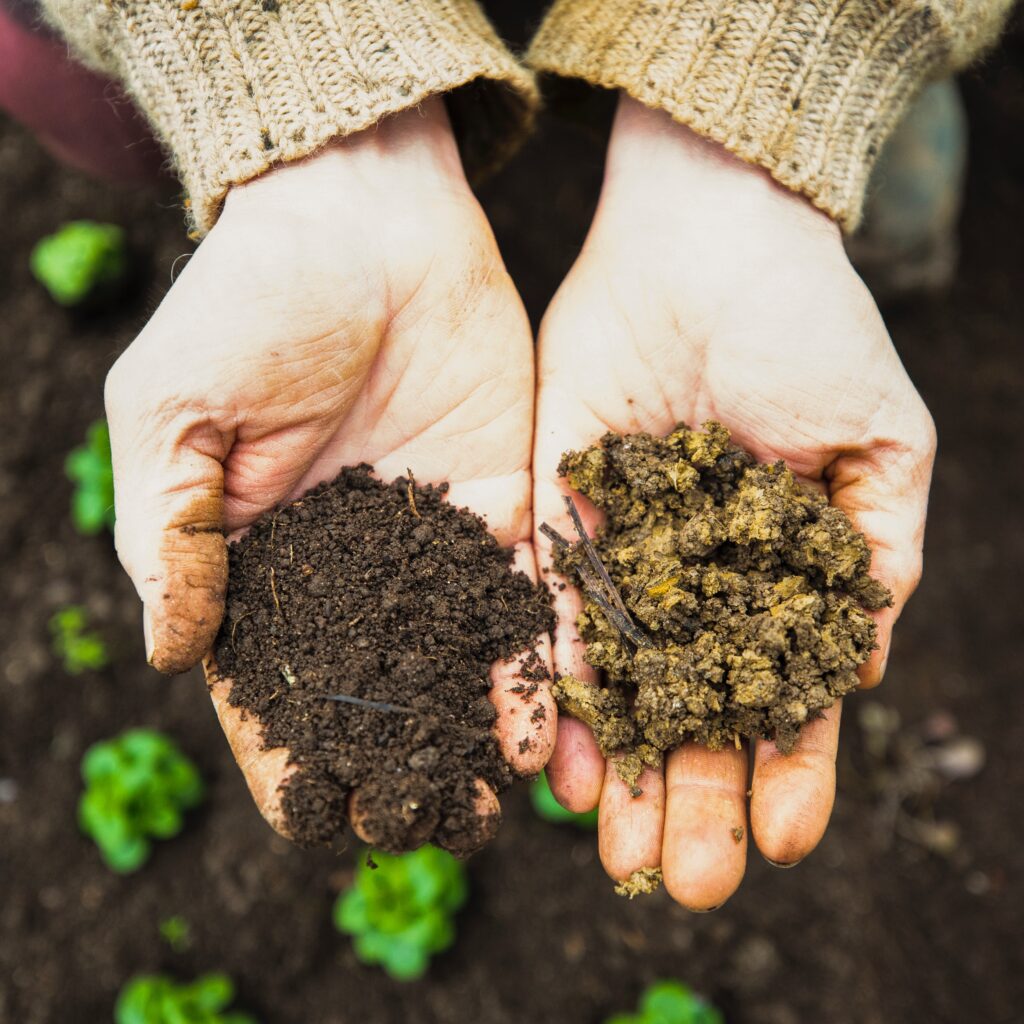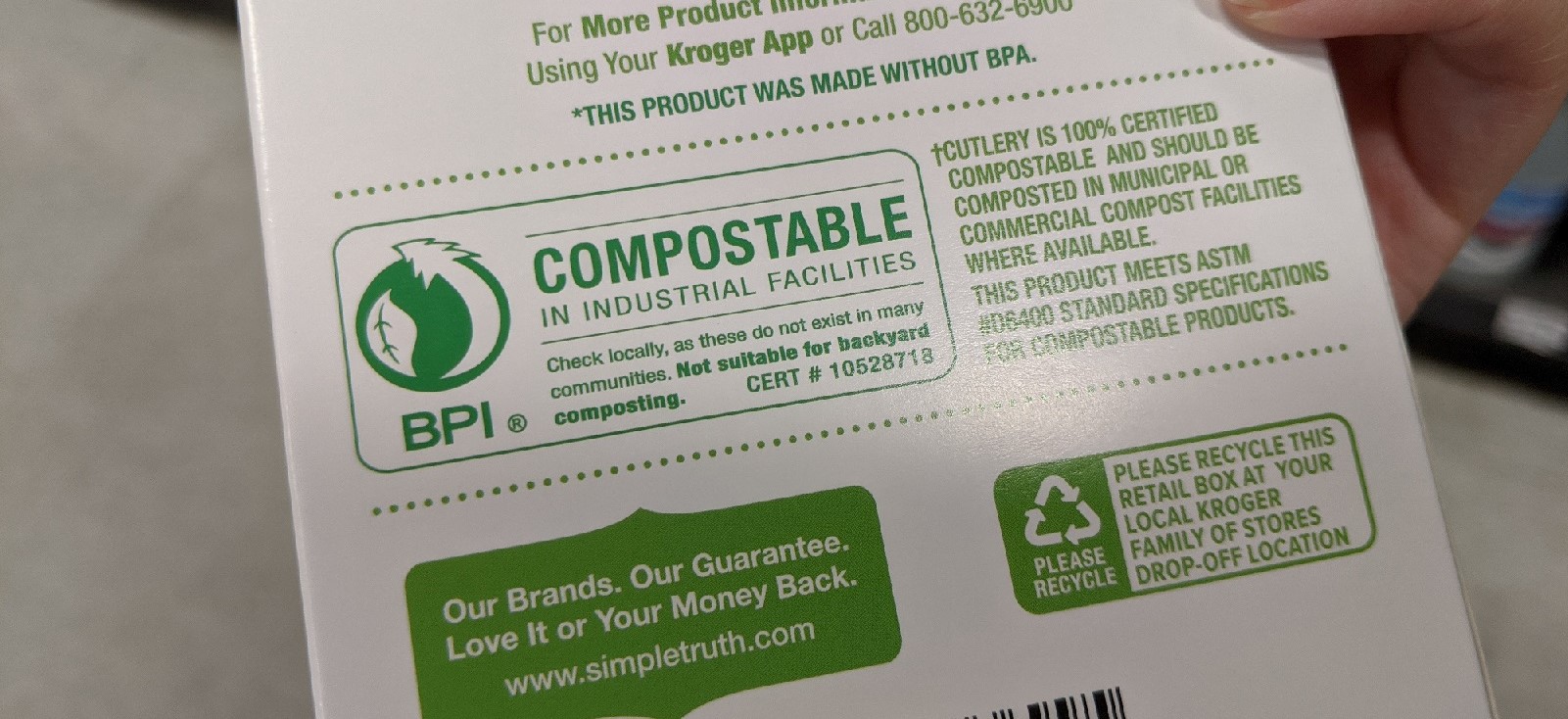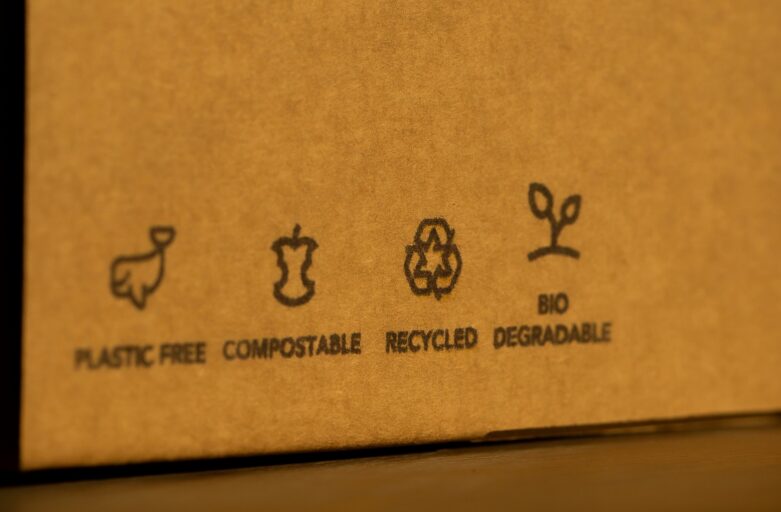The terms “compostable” and “biodegradable” are sometimes used interchangeably, when in reality, though similar, they mean different things. All compostables are biodegradable but not all biodegradables are compostable. Both facilitate the recycling of organic waste through natural or biological processes, but there are a few key differences. Being able to distinguish compostable vs biodegradable will help inform better sustainable choices.
The Definitions
Compostable
This term refers to items that will breakdown naturally into non-toxic, organic material, called humus. This “humus” is nutrient-rich and can be reused as food for plants and gardens.

To trigger the proper microbial decomposition, specific conditions are required for this process: ample oxygen, heat, and humidity. This decomposition usually takes place within a specific time frame (under proper conditions) of several days to several months.
Because composting requires specific conditions, there is a further distinction between residential/backyard compostable and industrially/commercially compostable. Things like food scraps, leaves, grass clippings, etc are compostable at home because sufficient heat and moisture can easily be supplied with minimal effort. However, organics like meat and dairy or manufactured compostables like bioplastics, need much higher levels of heat, moisture, and air to promote decomposition. At facilities, specialized equipment (chippers, grinders, mixers) as well as heat, humidity, and airflow controls allow for a more intensive and methodical composting process.
Biodegradable
This term refers to products that also breakdown naturally over time and assimilate back into the environment. However, there are no specific conditions needed and no specified time frame; it could take months, years, decades, or even centuries. Additionally, the resultant material can be organic, but may also include toxic chemicals or microplastics.
If you think about it, practically anything can be thought of as biodegradable. Eventually (even if it takes centuries), all things will disintegrate. But the term is generally used for items that are plant-based to some degree or that breakdown within a “reasonable timeframe.” If you’re scratching your head, I don’t blame you. There’s a lot of ambiguity here which can lead to deceptive marketing, but more on that later.
Bioplastics
These are plastic alternatives that are made with organic or plant-based material rather than petroleum-based materials. These can come in both forms: compostable and biodegradable. More often than not, both compostable and biodegradable bioplastics need to be processed in a commercial facility rather than a residential compost bin.
Though these are technically considered a plastic, they CANNOT be recycled with other plastics. Additionally, the degradation process for bioplastics is not effective in marine environments. So the use of bioplastics doesn’t alleviate the issue of plastic pollution in waterways and oceans.
A Couple Caveats
Though the progress toward compostable and biodegradable products is commendable, you should keep in mind the following two caveats.
The Lack of Standardization
As alluded to above, there is ambiguity and no standardization when it comes to labeling products compostable vs biodegradable. The “compostable” label is pretty straightforward. An item must pass specific testing before it can be labeled or certified as such. And companies are getting better at distinguishing items that are only compostable at a facility.

However, the “biodegradable” label is ripe for “greenwashing” (the act of marketing something as more environmentally sustainable than it actually is). The term “biodegradable” doesn’t require any certification, which means that companies can claim a product is “biodegradable” whenever they want. This false marketing is rather common since, as mentioned above, practically anything can be claimed as biodegradable. It’s a matter of stretching the truth.
Take a plastic bottle, which is estimated to take around 450 years to decompose. I wouldn’t call that biodegradable, but a marketing team might do so just to grab the attention of the conscious consumer. Their argument would be that the bottle does break down *then in fine print* eventually, after hundreds of years while also becoming microplastic pollution. A poor argument, but many companies get away with this type of greenwashing.
So when you see the term “biodegradable,” take it with a grain of salt and use your best judgement based on the composition. If the majority of the composition isn’t organic-based, there’s a high likelihood it isn’t the kind of biodegradable you want. A step in the right direction, the FTC (Federal Trade Commission) has issued its “Green Guides” to help marketers avoid false or misleading claims regarding environmentally sustainable products or practices.
The Destination
There are really only two proper disposal locations for compostables: a home compost bin or an industrial composting facility. If disposed anywhere else, such as a landfill, it loses its eco-friendliness and might as well just be another piece of trash.
Remember, composting requires oxygen to bring about the right microbes for decomposition. The conditions in a landfill are oxygen-free because the massive piles of refuse prevent oxygen flow. As such, the process of “composting” can’t occur in a landfill, so even organic materials will take longer to breakdown. Furthermore, the microbes that are active in oxygen-free conditions produce methane, a greenhouse gas largely responsible for climate change. Hence, things that degrade in a landfill produce methane, even compostables and biodegradables.
Compostable vs Biodegradable: which is better?
In my opinion, I would choose compostable, solely because it is more straightforward. I can determine proper disposal without thinking too hard. Plus, I can get nutrient humus from my compost bin, in return. The ambiguity of the term “biodegradable” makes me cautious, concerning the pitfalls of potential greenwashing. Unless, I want to take the time to research online what the company means with its label (often times not publicly transparent), I don’t put a lot of faith behind that claim.
As a consumer, I think it’s a great step for you to know the differences regarding compostable vs biodegradable. The real eco benefits of each are only achieved with proper disposal, but at the very least they provide alternatives to petroleum-based plastics. They demonstrate more conscious production materials, even though the end-of-life phase is still flawed. Only flawed because most people don’t know how composting works or why proper disposal of compostable and biodegradables is important.
But not you! Now you know the 411 when it comes to compostable vs biodegradable. Just remember:
- Check the labels:
- formal certification ✔
- residential vs industrial compost ✔
- vague use of “biodegradable” ❌
- Compostables and biodegradables act like any other trash in a landfill – decomposing slowly, while producing methane
- If you want it to compost, start your own compost or research facilities near you
Now you can take this knowledge with you and continue to live your best green!

